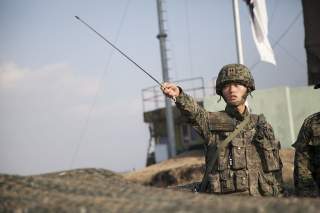Why America Should Not Be Asia's Globo-Cop
The Korean peninsula is no longer critical for U.S. security.
Of particular concern to some policymakers is the prospect of Washington’s allies building nuclear weapons in the absence of a U.S. willingness to go to nuclear war. The Obama administration recently reiterated its “ironclad and unwavering” commitment to “the U.S. nuclear umbrella.” Last month, according to Defense Secretary Ashton Carter, the two governments “discussed a number of ways that extended deterrence can be further strengthened.” While nonproliferation is a worthy end, it is not the highest good for U.S. policy. Protecting America is. And there is nothing at stake in the Korean peninsula that warrants Washington getting into a nuclear conflict of choice.
The prospect of a growing North Korean arsenal puts a premium on efforts to forestall a hostile DPRK with an arsenal potentially directed at the United States. More seriously engaging Beijing by addressing its interests may be the best strategy. But Pyongyang’s program also requires rethinking a policy that ensures only the “bad guys”—Russia, China, and North Korea—have nukes in Northeast Asia. Allowing or even encouraging the ROK and Japan to build countervailing arsenals surely is not a good option, though not because it would “pose more difficulties for Washington to persuade Pyongyang to give up its nuclear arsenal,” as Vu claims. If he hasn’t noticed, after a quarter century the North has refused to do so, and virtually no one today believes that it will disarm voluntarily. Indeed, Director Clapper recently called this effort a “lost cause.”
Nevertheless, despite the danger of any spread of nuclear weapons, allied proliferation may be better than expecting America to risk Los Angeles and Seattle to protect Seoul. It’s time for a serious debate over the issue, rather than to mindlessly reinforce the status quo and keep Washington entangled in the ever more dangerous Korean imbroglio.
Guaranteeing South Korea’s security has not made sense from America’s standpoint for years. But the North’s ongoing missile and nuclear efforts have dramatically highlighted the real cost of the continuing commitment. While developing missile defense is a worthwhile response, even more obvious is simply walking away from a potential conflict in which Washington has no reason to be involved. After more than six decades, the United States should kick South Korea off America’s defense dole.
Doug Bandow is a Senior Fellow at the Cato Institute and a former Special Assistant to President Ronald Reagan. He is author of Tripwire: Korea and U.S. Foreign Policy in a Changed World and co-author of The Korean Conundrum: America’s Troubled Relations with North and South Korea.
Image: Republic of Korea Army 1st Lt. Choi Min Kyu points across the border into North Korea. Wikimedia Commons/Department of Defense

